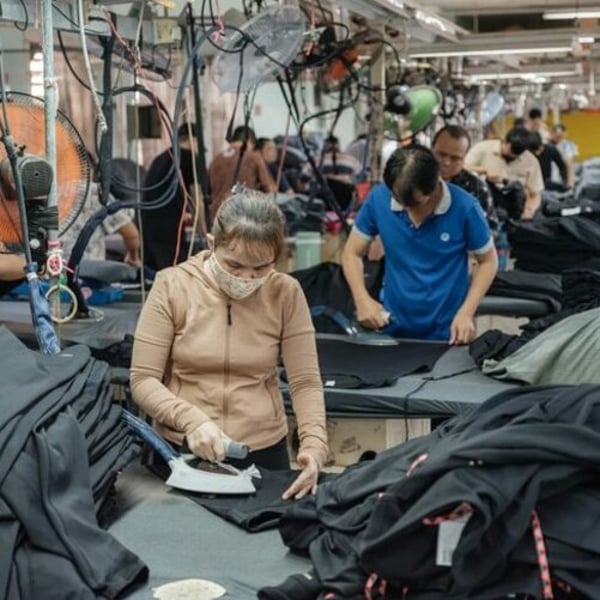By
Bloomberg
Published
June 15, 2025
The US and Vietnam are closing in on a framework trade agreement, despite ongoing concerns about Chinese goods being rerouted through the Southeast Asian nation to avoid tariffs, according to people familiar with the talks.

Negotiations have progressed, with Vietnam seeking to secure tariffs in the range of 20% to 25%, said the people, who asked not to be identified as the discussions are private and nothing is finalized.
The agreement would also include a series of US demands, such as stricter enforcement against the transshipment of Chinese products and the removal of non-tariff barriers, the people said. While the final details are unclear, Vietnam had earlier offered to remove all tariffs, as well as to step up trade enforcement and boost purchases of American goods.
The final contours of the framework are still being fleshed out in ways needed to secure President Donald Trump’s sign-off, said people familiar with the matter who asked for anonymity to speak candidly about the discussions. More meetings are expected Friday in Washington to address some technical details, they said.
Vietnam’s foreign affairs ministry did not immediately respond to a request for comment. The White House had no immediate comment.
Trump has struggled to reach trade accords by a July 9 deadline for higher tariffs to kick back in. The US has reached one framework plan — with the UK — and a tariff truce with China. Trump on Wednesday said he intended to send letters to trading partners setting unilateral tariff levels — effectively “take it or leave it” offers — within one to two weeks.
Vietnam poses a particular challenge for the Trump administration, as some in Washington consider it a strategic partner in efforts to counter China in Asia, while its exports of consumer goods from clothes to smartphones have become staples for American consumers.
But its trade connections with China have inflamed relations with Washington. During Trump’s economic battle with Beijing in his first term, manufacturers shifted to Vietnam, building the kind of massive trade surplus that has drawn the ire of Trump and his top advisers.
US Trade Representative Jamieson Greer nodded to the progress of talks on Thursday, telling Fox News that he “just came from a meeting with the Vietnamese that was very helpful, and we’ll see if we’re able to land something with them.”
Greer described a range of options on the table since Trump’s April 2 announcement of higher tariffs on dozens of economies, which were put on hold to allow time for negotiations.
Nations have presented plans to “give us more market access, they change some of their harmful policies, and they could qualify for a type of modified tariff depending on how our president feels and how their leaders feel,” he said on Fox.
For Trump, Vietnam offered the promise of a quick solution — and it’s still a test case for the administration’s ability to ink deals with Southeast Asian nations. Vietnam raced to launch trade talks with the US and was singled out by Trump for showing a willingness to negotiate.
Still, the talks have been complicated by Trump’s zeal to shrink trade deficits with China — and ongoing negotiations with Beijing that could further lower rates.
Some US officials want to calibrate tariffs for Vietnam and others in Southeast Asia to ensure they’re sufficiently lower than what’s imposed on China to encourage production to leave the country, according to people familiar with the matter.
Yet if they’re too low, the rates may only exacerbate Vietnam’s high trade surplus with the US and encourage further shipment of Chinese goods though the country, the people said.
Trump said Wednesday the US is maintaining a total of 55% tariffs on Chinese imports after talks in London, but his aides have not said whether that number is a floor.
Some of Trump’s top trade officials also want to crack down on what they call transshipment — where Chinese goods are minimally finished or repackaged in other countries to avoid tariffs — yet it’s unclear whether the US president sees the issue as a deal breaker.
Hanoi has increased efforts to enforce country-of-origin standards in part to assuage US concerns.
White House trade adviser Peter Navarro sees Vietnam as a particularly notable offender when it comes to transshipment, having called the country “essentially a colony of communist China” during an April interview with Fox News. Chinese products are brought into Vietnam, he said at the time, and “they slap a made-in-Vietnam label on it, and send it here to evade the tariffs.”
US Commerce Secretary Howard Lutnick echoed that concern earlier this month at a Senate hearing.
“They buy $90 billion from China, then they mark it up and send it to us,” Lutnick said. “So it’s just a pathway of China to us.”
Yet Trump has previously signaled a clear interest at cutting deals — even if they’re imperfect or not fully fleshed out. And an initial framework agreement leaves the opportunity for further concessions later.







